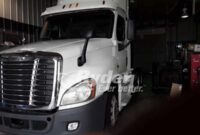New 1 Ton Trucks For Sale: Your Ultimate Guide to Heavy-Duty Hauling sale.truckstrend.com
In the world of pickup trucks, the term "1 ton" evokes images of raw power, immense capability, and unwavering durability. These aren’t just vehicles; they’re mobile workhorses, designed to tackle the most demanding towing and hauling tasks that would leave lesser trucks struggling. Whether you’re a contractor needing to transport heavy equipment, a farmer pulling large trailers, an RVer dreaming of towing a massive fifth-wheel, or simply someone who requires uncompromising strength for their lifestyle, new 1-ton trucks for sale represent the pinnacle of consumer-grade utility. This comprehensive guide will delve into everything you need to know about these formidable machines, helping you navigate the market and make an informed decision.
Understanding the "1 Ton" Designation: More Than Just a Number
New 1 Ton Trucks For Sale: Your Ultimate Guide to Heavy-Duty Hauling
The "1 ton" designation is a historical artifact, harkening back to a time when a truck’s payload capacity was roughly 2,000 pounds (one ton). In today’s automotive landscape, this nomenclature is largely symbolic. Modern 1-ton trucks (also known as 3500-series or F-350 equivalent trucks) boast payload capacities that often far exceed 2,000 pounds, with some configurations capable of carrying over 7,000 pounds in their bed and towing upwards of 35,000 pounds.
What truly defines a 1-ton truck today are its heavy-duty components:
- Robust Frame: Built with thicker, stronger steel to handle extreme loads.
- Heavy-Duty Suspension: Stiffer springs, larger shocks, and often additional helper springs for stability under load.
- Powerful Engines: Almost exclusively offer large gasoline V8s or high-torque turbo-diesel engines.
- Stronger Axles and Brakes: Designed to manage immense weight and provide reliable stopping power.
- Dual Rear Wheels (Dually Option): Many 1-ton trucks offer a dually configuration, which adds two extra wheels to the rear axle, significantly increasing stability, tire contact patch, and often payload/towing capacity.

The critical figures to look for when evaluating a 1-ton truck are its Gross Vehicle Weight Rating (GVWR), which is the maximum permissible weight of the truck itself including occupants, fuel, and cargo, and its Gross Combined Weight Rating (GCWR), the maximum permissible weight of the fully loaded truck plus a fully loaded trailer. These numbers, along with the specific payload and towing capacities for a given configuration, are paramount to ensuring the truck meets your needs safely.
Key Manufacturers and Popular Models
The market for new 1-ton trucks is dominated by the "Big Three" American automakers, each offering a compelling lineup with distinct advantages:
- Ford Super Duty F-350: A perennial bestseller, the F-350 is renowned for its immense towing capabilities, powerful engine options (including the mighty Power Stroke diesel and robust gas V8s), and innovative work-oriented features like Pro Power Onboard (an integrated generator system) and advanced towing technologies. Ford offers a wide range of trims from basic work trucks to luxurious King Ranch and Platinum editions.
- Ram 3500: Ram trucks are celebrated for their class-leading interiors, which blend rugged capability with surprising luxury and technology. The Ram 3500 offers the legendary Cummins turbo-diesel engine, known for its longevity and immense torque, alongside a powerful HEMI gasoline engine. Ram also excels in ride comfort, even for a heavy-duty truck, thanks to available air suspension systems.
- Chevrolet Silverado 3500HD / GMC Sierra 3500HD: These GM twins share a common platform but offer distinct styling and trim levels. Both are powered by robust gasoline V8 or the venerable Duramax turbo-diesel paired with the Allison transmission, a highly respected powertrain combination. They are known for their strong performance, comfortable cabins, and useful trailering tech, including up to 15 camera views for unparalleled visibility. GMC often positions itself as a more premium offering with unique design elements and exclusive features like the MultiPro/Multi-Flex tailgate.

Engine Options: Gasoline vs. Diesel

Choosing between a gasoline and a diesel engine is one of the most significant decisions when buying a new 1-ton truck, as each has distinct characteristics suited for different applications.
-
Gasoline Engines:
- Pros: Lower upfront cost, less expensive and simpler maintenance, generally quicker warm-up in cold weather, often quieter operation.
- Cons: Lower torque output compared to diesel (especially for heavy towing), typically worse fuel economy under load, shorter engine lifespan in extreme heavy-duty cycles.
- Ideal For: Buyers who don’t consistently tow at the absolute limits of the truck, those with a tighter budget, or those who prioritize lower maintenance costs and simpler mechanics.
-
Diesel Engines:
- Pros: Massive torque for effortless heavy towing and hauling, superior fuel economy (especially when loaded), exceptional durability and longevity (often capable of hundreds of thousands of miles), strong resale value.
- Cons: Higher upfront cost (often a $10,000+ premium), more expensive and complex maintenance (e.g., diesel exhaust fluid, specialized filters), slower warm-up, can be louder.
- Ideal For: Buyers who regularly tow heavy trailers (RVs, equipment haulers), commercial users, or those who prioritize maximum capability and long-term reliability.
Cab, Bed, and Drivetrain Configurations
New 1-ton trucks offer a myriad of configurations to suit various needs:
-
Cab Styles:
- Regular Cab: Two doors, single row of seating. Best for maximizing bed length in a shorter overall footprint, ideal for work trucks.
- Extended Cab (SuperCab/Double Cab): Four doors (rear doors often smaller/reverse-hinged), two rows of seating but with limited rear legroom. A good compromise for occasional rear passengers.
- Crew Cab (SuperCrew/Mega Cab): Four full-sized doors, spacious rear seating. Most popular choice for families, road trips, and those who regularly transport multiple passengers.
-
Bed Lengths:
- Short Bed (approx. 6.5 feet): More maneuverable, but limits cargo space.
- Long Bed (approx. 8 feet): Essential for maximizing cargo volume and often required for certain fifth-wheel hitches.
-
Drivetrain:
- 2WD (Two-Wheel Drive): Typically rear-wheel drive. Lighter, slightly better fuel economy, lower cost. Sufficient for most on-road towing.
- 4WD (Four-Wheel Drive): Provides enhanced traction in off-road conditions, snow, mud, or slippery boat ramps. Adds weight, complexity, and cost.
-
Single Rear Wheel (SRW) vs. Dual Rear Wheel (DRW – Dually):
- SRW: More common, narrower stance, easier to maneuver and park. Suitable for most heavy towing needs.
- DRW: Significantly increases payload and towing stability, especially for wide or heavy trailers. Offers more tire contact for grip and redundancy in case of a flat. Wider stance makes it less convenient for daily driving and parking.
Technology and Features to Look For
Modern 1-ton trucks are far from bare-bones work vehicles. They integrate advanced technology to enhance safety, convenience, and capability:
- Advanced Driver-Assistance Systems (ADAS): Adaptive cruise control, lane-keeping assist, blind-spot monitoring (often with trailer coverage), automatic emergency braking.
- Towing-Specific Technologies: Trailer backup assist, integrated trailer brake controllers, trailer tire pressure monitoring, trailer camera systems (including transparent trailer view), weigh scales, and smart hitch guidance.
- Infotainment: Large touchscreens with Apple CarPlay, Android Auto, navigation, and Wi-Fi hotspots.
- Work-Oriented Features: Integrated bed lighting, power outlets (including 120V/240V), bed steps, spray-in bedliners, storage solutions, and power tailgates.
- Comfort and Convenience: Heated/ventilated seats, power-adjustable pedals, multiple charging ports, remote start, and premium audio systems.
Important Considerations Before Buying
Purchasing a new 1-ton truck is a significant investment. Careful consideration of these factors will ensure you choose the right truck for your needs:
-
Define Your Needs Precisely:
- Primary Use: Will it be a dedicated work truck, an RV hauler, a daily driver, or a combination?
- Payload Requirements: What is the heaviest item you’ll regularly carry in the bed (e.g., a slide-in camper, tools, materials)? Calculate its weight.
- Towing Requirements: What is the maximum weight of the trailer you intend to tow? Include the weight of the trailer itself plus all its cargo, water, etc. Also, consider the type of hitch (conventional bumper pull, fifth-wheel, gooseneck).
- Passenger Capacity: How many people will you regularly transport?
-
Understand Payload and Towing Capacities: Do not rely on marketing claims alone. Always check the specific payload and towing capacities listed on the door jamb sticker or in the owner’s manual for the exact configuration (engine, cab, bed, drivetrain, SRW/DRW) you are considering. These numbers vary significantly.
-
Budget Beyond the Purchase Price:
- Fuel Costs: Diesel trucks are more fuel-efficient when working hard, but diesel fuel is often more expensive per gallon.
- Maintenance: Diesel maintenance can be more costly due to specialized components and fluids.
- Insurance: Heavy-duty trucks can have higher insurance premiums.
- Registration: Heavier vehicles often incur higher registration fees.
- Tires: Dually trucks require six tires, making replacements more expensive.
-
Test Drive Thoroughly: Don’t just drive it empty. If possible, test drive a truck that is similarly equipped to how you’ll use it. Pay attention to steering, braking, ride comfort, and visibility. If you have a specific trailer, ask the dealership if you can hook it up for a test tow (though this is rarely possible).
-
New vs. Used: While this article focuses on new trucks, consider that used 1-ton trucks can offer significant savings. However, new trucks come with full warranties, the latest technology, and the ability to customize your build exactly.
The Buying Process and Financing
Once you’ve narrowed down your choices, the buying process for a new 1-ton truck typically involves:
- Research and Configuration: Use manufacturer websites to build and price your ideal truck.
- Dealership Visits: Test drive different models. Discuss pricing, available incentives, and trade-in values.
- Financing: Explore options like manufacturer financing (often with special APRs or cash back), bank loans, or credit union loans. Compare interest rates and terms.
- Negotiation: Don’t be afraid to negotiate the price, especially if you have competing offers. Look for end-of-month or end-of-year sales.
- Custom Orders: If the exact configuration you want isn’t on the lot, you can often custom order a truck from the factory, though this will involve a wait time.
New 1 Ton Trucks For Sale: Estimated Starting Price Guide
It’s crucial to understand that the prices below are estimated starting MSRPs for base models and can vary significantly based on trim level, engine choice, cab/bed configuration, 2WD/4WD, SRW/DRW, and added options. A fully loaded 1-ton truck can easily exceed $100,000. Always check current manufacturer websites and local dealer inventories for precise pricing.
| Make | Model | Estimated Starting MSRP (SRW, Gas, 2WD, Base Trim) | Key Feature Highlights | Target User |
|---|---|---|---|---|
| Ford | F-350 Super Duty | $47,000 – $55,000 | Class-leading towing, available Pro Power Onboard, extensive trim levels, powerful engines. | Commercial fleets, heavy equipment haulers, large RV/fifth-wheel owners, contractors. |
| Ram | 3500 | $48,000 – $56,000 | Luxurious interiors, powerful Cummins diesel, comfortable ride (air suspension available). | RVers, those valuing comfort/tech, heavy haulers seeking premium experience. |
| Chevrolet | Silverado 3500HD | $46,000 – $54,000 | Proven Duramax/Allison powertrain, intuitive trailering tech, comfortable cabin. | General heavy-duty users, farmers, those loyal to GM, balanced capability. |
| GMC | Sierra 3500HD | $47,000 – $57,000 | Premium styling, MultiPro/Multi-Flex tailgate, refined interior, strong capability. | Users seeking a more upscale heavy-duty truck, contractors wanting unique features. |
Note: Prices are highly dynamic and subject to change based on market conditions, manufacturer incentives, and specific configurations.
Frequently Asked Questions (FAQ)
Q1: What exactly defines a "1-ton" truck in today’s market?
A1: Historically, it referred to a 2,000-pound payload capacity. Today, it signifies a heavy-duty pickup truck (like a 3500-series or F-350) with significantly higher payload and towing capacities than light-duty or 3/4-ton trucks, often exceeding 7,000 lbs payload and 35,000 lbs towing in top configurations.
Q2: Do I really need a 1-ton truck, or will a 3/4-ton suffice?
A2: It depends entirely on your maximum towing and payload needs. If your fully loaded RV or trailer exceeds the capabilities of a 3/4-ton truck (e.g., a large fifth-wheel or toy hauler), or if you regularly carry extremely heavy loads in the bed (like a large slide-in camper), then a 1-ton truck is necessary for safety and compliance. Always check the weight ratings of what you intend to haul.
Q3: Is diesel always the better choice for a 1-ton truck?
A3: Not always. Diesel engines offer superior torque for heavy towing and better fuel economy when working hard, along with greater longevity. However, they come with a higher upfront cost, more expensive maintenance, and can be less ideal for short trips or infrequent heavy use. If you only occasionally tow very heavy loads or prioritize lower initial costs and simpler maintenance, a gasoline engine might be more suitable.
Q4: How much can a new 1-ton truck typically tow?
A4: Towing capacities vary greatly by manufacturer, engine, cab/bed configuration, and whether it’s a single rear wheel (SRW) or dual rear wheel (DRW) model. Maximum conventional towing typically ranges from 15,000 to 20,000+ pounds, while fifth-wheel/gooseneck towing can exceed 35,000 pounds for top-tier diesel dually configurations. Always consult the specific truck’s ratings.
Q5: What’s the difference between SRW and DRW (dually) and which should I choose?
A5: SRW (Single Rear Wheel) trucks have two wheels on the rear axle, like a standard pickup. DRW (Dual Rear Wheel) trucks, or "duallies," have four wheels on the rear axle. DRW significantly increases stability, payload, and often towing capacity, especially for wide or very heavy trailers, and offers a safety net in case of a rear tire blowout. However, duallies are wider, heavier, and less maneuverable for daily driving. Choose DRW if you’re consistently towing at the upper limits or hauling extremely heavy fifth-wheel campers.
Q6: Are 1-ton trucks comfortable for daily driving?
A6: Modern 1-ton trucks have made significant strides in comfort, especially in higher trim levels. They offer comfortable interiors, advanced infotainment, and improved ride quality compared to their predecessors. However, they are still large, heavy-duty vehicles with stiff suspensions, so they won’t ride like a car or even a half-ton pickup, especially when empty. Maneuvering and parking can also be challenging in urban environments.
Conclusion
New 1-ton trucks for sale represent the pinnacle of consumer-grade truck capability, offering unmatched power, payload, and towing capacities for the most demanding tasks. From the rugged Ford F-350 to the luxurious Ram 3500 and the versatile Chevrolet/GMC 3500HD twins, each manufacturer brings its unique strengths to the table. By understanding the "1 ton" designation, meticulously evaluating engine options, configurations, and technology, and carefully considering your specific needs and budget, you can confidently choose a heavy-duty truck that will serve as a reliable and powerful partner for years to come. Investing in a new 1-ton truck is an investment in capability, ensuring you’re always ready for the biggest jobs and the grandest adventures.



